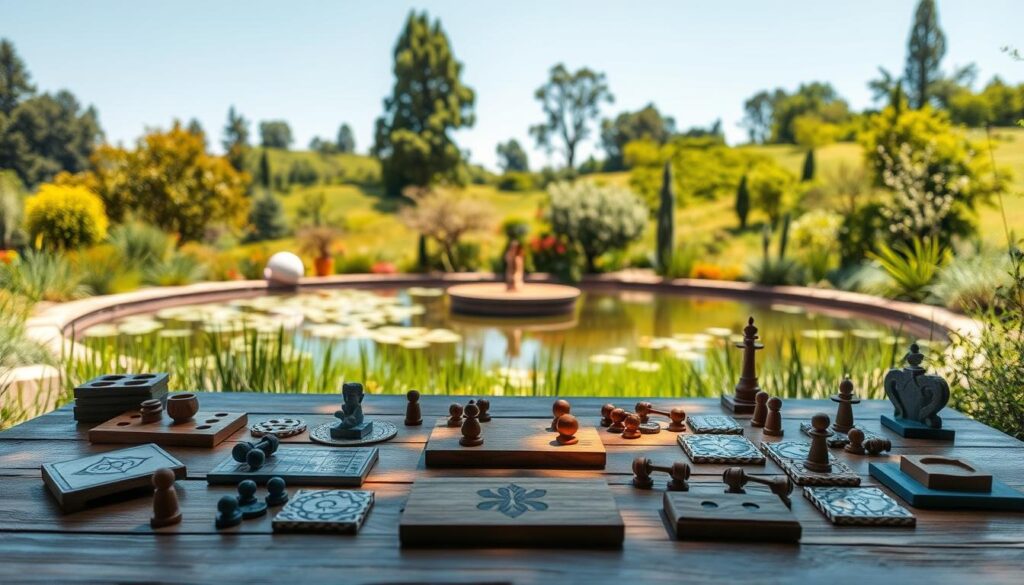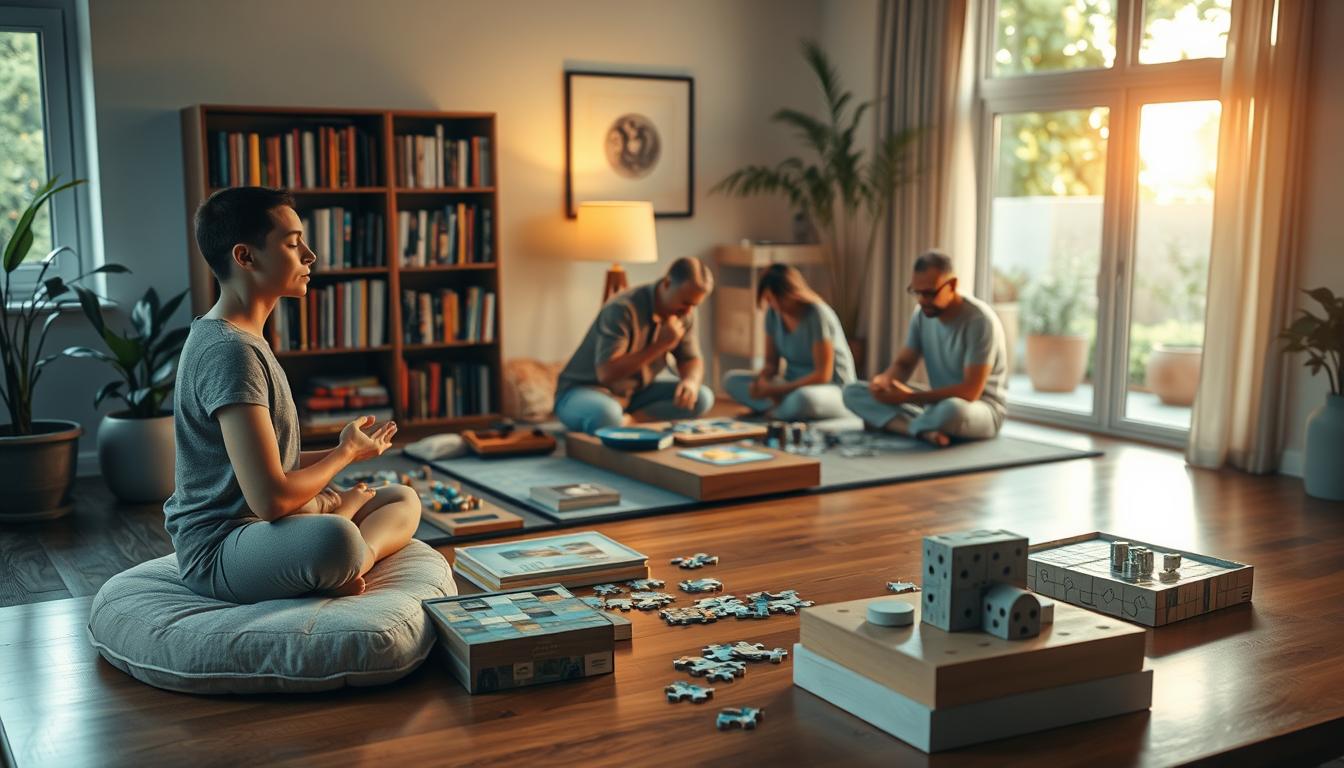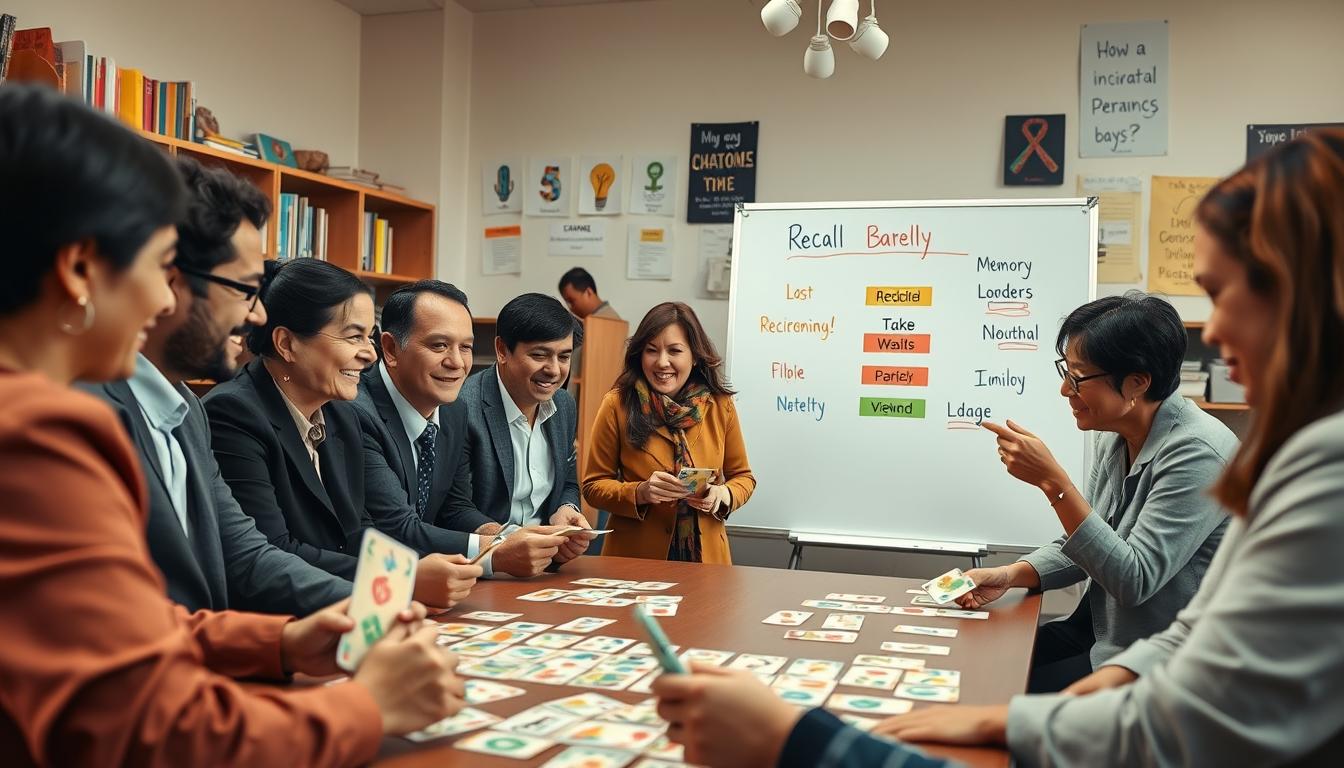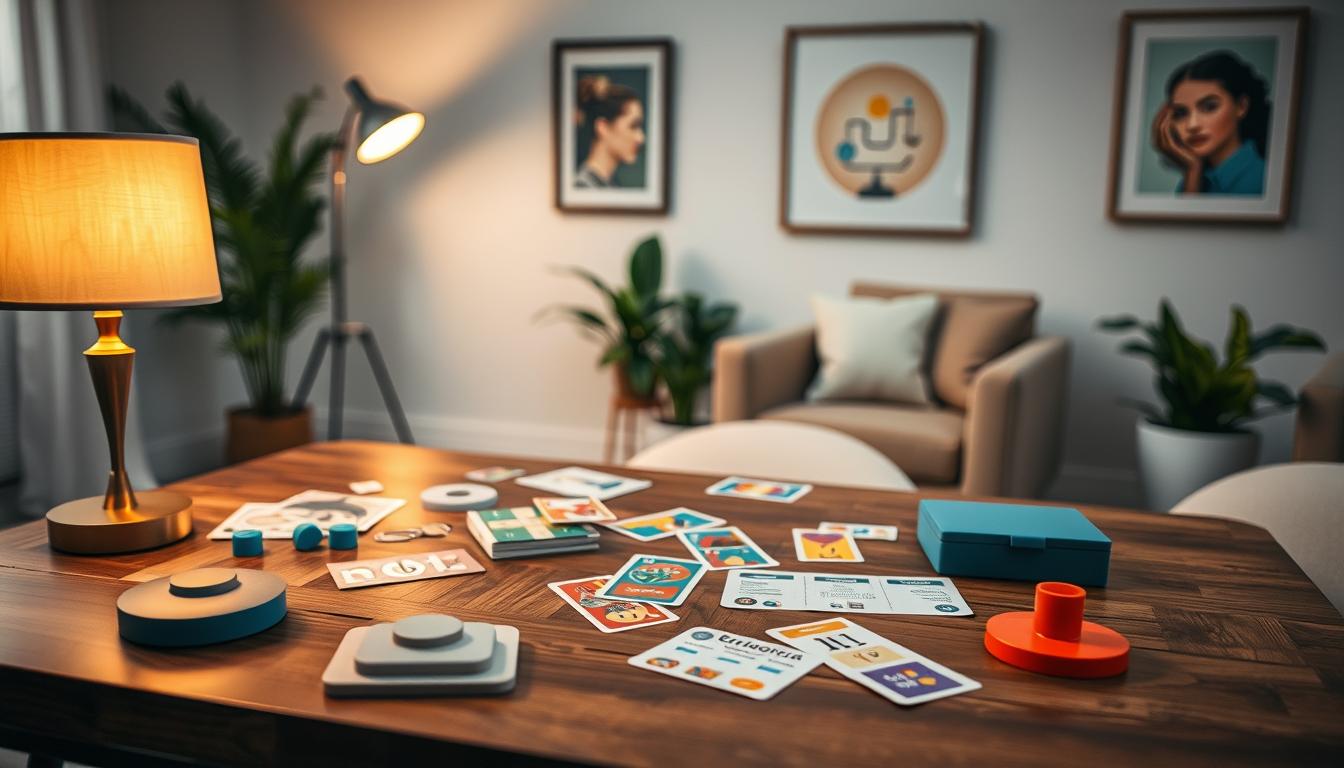Games that combine mindfulness practices with logic-based tasks for adults
Have you ever wondered if playing games could not only entertain but also enhance your mental well-being?
Games that mix mindfulness with logic tasks can really boost your brain. They help adults improve their mental sharpness. These games are fun and also teach you to focus, solve problems, and understand emotions better. This article will show you different games, from digital apps to classic board games. They all aim to improve your mindfulness and logical thinking.
Introduction to Mindfulness and Logic-Based Games
Mindfulness is a powerful practice that helps us stay present. It makes us fully engage with the moment. By doing this, it reduces stress and boosts our thinking skills.
It teaches us to pay attention to our thoughts, feelings, and surroundings. This awareness helps lower anxiety and improves our mental health.
Logic-based games require us to think deeply and solve problems. They present us with complex challenges that need careful planning and critical thinking. Playing these games sharpens our mental abilities.
When we combine mindfulness with logic-based games, we get a unique experience. It allows us to dive into the game while improving our mental clarity.

Benefits of Mindfulness in Gaming
Gaming with mindfulness offers many benefits beyond fun. It boosts focus and emotional smarts. This mix of mindfulness and gaming helps people grow and get better at skills.
Players learn to notice their thoughts and feelings more. This leads to a richer gaming experience.
Enhancing Focus and Concentration
Mindfulness in games sharpens focus and concentration. Players become more aware of their actions. This improves decision-making in games and real life.
Games that focus on mindfulness help players stay present. This boosts their ability to focus on tasks. As a result, they become more productive outside of gaming too.
Improving Emotional Intelligence
Games with mindfulness boost emotional intelligence. Players learn to understand their emotions and those of others. This builds empathy and better communication skills.
With time, people become more aware of their emotions. This skill is valuable in gaming and everyday life.

The Role of Logic in Brain Games
Logic is key in brain games for boosting cognitive skills. These games help improve problem-solving and decision-making. Players learn to think deeply and choose wisely, sharpening their minds.
Playing these games can greatly enhance daily life. It’s a fun way to get better at thinking and making smart choices.
Developing Problem-Solving Skills
Games that focus on logic challenge players to solve complex problems. They need to find creative solutions. This practice makes solving problems faster and easier in life.
Enhancing Decision-Making Abilities
Brain games also improve decision-making skills. Players must consider different outcomes and risks. This helps them make better choices every day.
By playing these games, people become more confident in their decisions. It’s a great way to sharpen your judgment.
Popular Games that Combine Mindfulness Practices with Logic-Based Tasks for Adults
Many games mix mindfulness with logic tasks, making them fun for adults. MentalUP is a great example. It has brain-training activities that boost focus and include relaxation. Sudoku is also popular, needing logical thinking and focus.
Chess adds strategic thinking and problem-solving, keeping players mindful. Crossword puzzles improve vocabulary and engage the mind, promoting mindfulness through wordplay.
These games offer unique features for adult gamers. They combine cognitive challenges with mindfulness, helping improve mental well-being.
How Brain Games with Mindfulness and Logical Reasoning Blend Improve Cognitive Functions
Cognitive functions include memory, perception, and problem-solving. Playing brain games that mix mindfulness with logic can boost these skills. Many studies show the benefits of combining these activities, leading to better thinking.
A Scientific Perspective on Brain Games
Studies show that brain games with mindfulness can improve cognitive functions. These games help with memory and quick thinking. Lumosity’s research shows users get smarter from playing these games.
This supports the idea that playing logic games with mindfulness can keep your brain healthy.
What Studies Reveal About Memory and Focus
Recent studies show that mindfulness and logic games improve memory and focus. Players of these games can pay attention better and remember more. These games also make you more focused and mentally sharp.
| Aspect | Without Mindfulness | With Mindfulness |
|---|---|---|
| Memory Retention | Moderate Improvement | Significant Improvement |
| Focus | Vulnerable to Distractions | Enhanced Attention |
| Problem-Solving Speed | Standard | Increased Efficiency |
The Impact of App-Based Mindfulness and Logic Games
Mobile apps have changed how we use mindfulness and logic games. They offer easy access to mental exercises and relaxation techniques. These apps fit into our busy lives, making mindfulness easier to practice.
Mobile Solutions for Everyday Mindfulness
Apps like MentalUP provide brain training exercises that include mindfulness. They improve our thinking and emotional health. Users can enjoy activities that help them feel calm and clear, making mindfulness part of their daily life.
Accessibility and Convenience
Mobile apps are easy to use anywhere, anytime. This makes it simple for people to practice mindfulness without any hassle. Whether you’re waiting in line or taking a break, you can use these apps to improve your mental health and focus.
Classic Board Games Incorporating Mindfulness
Classic board games are great for improving mindfulness and logical thinking. They challenge our minds and help us connect with others. Playing these games helps us stay focused and present.
Examples of Engaging Board Games
Chess is a classic that requires deep focus and planning. Backgammon mixes strategy with luck, making players think carefully. Go and Scrabble also offer deep, engaging experiences.
The Therapeutic Qualities of Board Games
Board games are good for our mental health. They teach us patience and help us build emotional strength. Playing with others strengthens our bonds and creates a sense of community.
Riddles as Mindfulness and Logic Exercises
Riddles mix mindfulness and logic, asking us to think creatively in the moment. They help improve memory, sharpen problem-solving, and boost mental agility.
Working on riddles requires focus and active thinking. As we try to solve them, we learn to see things from different angles. This fun yet challenging way helps grow our minds and keeps us present.
There are many kinds of riddles, like word puzzles and lateral thinking challenges. Each type has its own benefits. Some riddles help us work together, improving our communication and teamwork. Others let us grow individually, exploring our own logic and thinking.
Digital Platforms for Mindfulness and Logic Training
Digital platforms have changed how adults learn mindfulness and logic. Now, brain training apps let users boost their thinking skills and practice mindfulness easily. These apps meet different learning needs, helping users focus better, understand emotions, and solve problems.
Top Apps for Brain Training
Apps like MentalUP and Lumosity are very popular. They offer games that make learning fun and challenging. Users like how these apps mix mindfulness with logic, offering feedback and plans tailored to their progress.
| App Name | Key Features | User Feedback |
|---|---|---|
| MentalUP | Fun games, customizable training, progress tracking | Positive feedback about improved focus and learning retention |
| Lumosity | Science-based activities, daily challenges, community features | Users report higher engagement and satisfaction with cognitive improvements |
User Experiences with Mindful Gaming Apps
What users say is key to knowing if mindful gaming apps work. Many say these apps help them relax and do better in daily life. They find it easy to fit these activities into their day, making digital tools great for sharpening the mind.
The Benefits of Cooperative Gameplay in Mindfulness
Cooperative gameplay offers a special chance to boost mindfulness and build friendships. It makes players work together, sharing moments that grow trust and emotional smarts. This shared adventure helps create strong bonds, key to forming mindful groups.
Strengthening Relationships Through Games
Cooperative games are great for making relationships stronger. Players face challenges that need clear communication and teamwork. This teamwork builds deeper understanding and empathy.
Games that focus on teamwork make players’ connections richer. It’s good for personal growth and social skills.
Community and Connection in Mindful Activities
Mindful communities grow through connection and support. Cooperative games help people connect while practicing mindfulness. Players learn to value each other’s skills and weaknesses.
This teamwork fosters a sense of belonging. It’s crucial for a healthy community spirit.
Choosing the Right Game for Your Mindfulness Journey
Choosing games that fit your mindfulness journey is key to clear thinking and calm. Many things matter when picking the perfect game. Think about your skill level, what you like, and what you want to improve. This way, you can enjoy your journey and the game itself.
Factors to Consider When Selecting a Game
When picking games for mindfulness, keep these points in mind:
- Skill Level: Pick games that match your skill to feel proud and not get stuck.
- Personal Interests: Choose themes and styles that you love to make playing more fun.
- Cognitive Benefits: Know what you want to get better at, like focus, memory, or solving problems.
Tailoring Gameplay to Individual Needs
Customizing your gameplay can make it even better. You can adjust things like:
- Adjusting Difficulty: Make the game easier or harder to fit your comfort level.
- Incorporating Mindful Practices: Add moments to think or meditate between playing.
- Setting Intentions: Set goals for each playtime to deepen your mindfulness journey.
Future Trends in Mindfulness and Logic Games
Gaming is changing fast, especially with mindfulness and logic games. New trends show a bright future for games that improve our minds and feelings. These changes aim to make games better for us and our mental health.
Artificial intelligence is becoming a big part of these changes. It makes games fit what each player needs. This means games can be more fun and good for our brains. Soon, games will be made just for you, thanks to data and smart design.
More games will be on our phones, mixing mindfulness and puzzles. These games let us practice mindfulness anywhere. They help us stay calm and focused, making them easy to use and fun.
Technology and wellness groups are working together too. They’re making games that teach us to think and feel deeply. Players will solve puzzles and learn about themselves, making games more meaningful.
| Trend | Description | Impact |
|---|---|---|
| AI Integration | Utilization of AI to personalize gaming experiences | Enhanced engagement and tailored learning |
| Mobile Game Growth | Increase in mobile apps blending mindfulness with logic | Greater accessibility and convenience for users |
| Wellness Collaborations | Partnerships between tech and wellness sectors | Improved mindfulness practices embedded in gaming |
Conclusion
Mindfulness and logic-based gaming are a great mix for improving our minds. These games help us focus better, understand our feelings, and solve problems. All these skills are key for dealing with life’s challenges.
There are many games out there, from mobile apps to board games. They show how easy it is to find fun and learn at the same time. Playing these games helps us become more aware of our thoughts and feelings.
So, let’s dive into the world of logic-based gaming. It’s a fun way to grow our minds and improve our well-being. Adding these games to our lives can make a big difference.
FAQ
What are mindfulness and logic-based games?
Mindfulness is about being fully present in the moment. Logic-based games, on the other hand, need you to think critically and solve problems. Playing these games together can boost your brain health and lower stress.
How do logic-based games improve cognitive skills?
Logic games sharpen your mind by making you think deeply and choose wisely. They help you solve problems better, which is good for both your personal and work life.
Can playing games enhance emotional intelligence?
Yes, games that focus on mindfulness help you understand your feelings better. This makes you more emotionally aware and boosts your emotional smarts.
What types of games promote mindfulness?
Games like MentalUP, Sudoku, chess, and crossword puzzles are great for mindfulness. They keep you in the moment and improve your thinking skills.
Are there scientific studies that support the benefits of brain games?
Yes, studies on Lumosity show brain games can really help. They make your memory, focus, and decision-making better.
What are the advantages of mobile apps for mindfulness and logic-based games?
Apps like MentalUP make it easy to play games that improve your brain and mindfulness. You can play anywhere, anytime, which is super convenient.
How do classic board games promote mindfulness?
Games like chess and backgammon are great for your mind. They help you think logically and socially, which is good for your mental health.
What role do riddles play in combining mindfulness with logic?
Riddles are perfect for mixing mindfulness and logic. They make you think creatively and stay present, which boosts your memory and problem-solving skills.
What are the best digital platforms for brain training?
Apps like MentalUP and Lumosity are top choices. They offer games that improve your brain and are loved by users for their effectiveness.
How does cooperative gameplay enhance mindfulness?
Playing together builds relationships and boosts emotional smarts. It creates a sense of community and encourages mindful interaction.
What factors should I consider when choosing a game for mindfulness?
Think about your skill level, what you enjoy, and what you want to improve. This helps pick a game that fits your mindfulness goals.
What future trends are emerging in mindfulness and logic games?
The future of these games looks exciting. New tech and AI will make games even better, helping you grow your mind and enjoy the journey.














